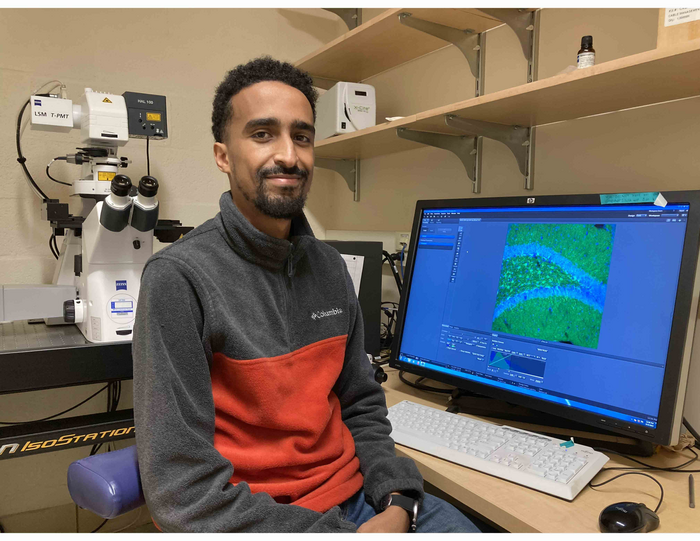New research at the University of Massachusetts Amherst zeroes in on the root cause of adverse health effects from disruption of the body’s circadian rhythms, which typically occurs from jet lag and rotating work shifts.

Credit: UMass Amherst
New research at the University of Massachusetts Amherst zeroes in on the root cause of adverse health effects from disruption of the body’s circadian rhythms, which typically occurs from jet lag and rotating work shifts.
The research, published in the journal eNeuro, also shows that the circadian clock gene Cryptochrome 1 (Cry 1) regulates adult neurogenesis – the ongoing formation of neurons in the brain’s hippocampus. Adult neurogenesis supports learning and memory, and its disruption has been linked to dementia and mental illness.
“Circadian disruption impacts a lot of things,” says lead author Michael Seifu Bahiru, a Ph.D. candidate in the lab of Eric Bittman, Professor Emeritus of Biology. “There are links to cancer, diabetes and hypertension, as well as adverse impacts on neurogenesis.”
Cell birth and survival in the adult hippocampus are regulated by a circadian clock, so its disruption may throw off the process of neurogenesis. In the U.S. alone, some 30 million people experience phase shifts in their circadian rhythms as they work rotating schedules.
Until recently, the researchers have faced a sort of chicken-or-egg question. “We always wondered what actually is the root cause of the ailments from circadian disruption?” Bahiru says. “Does the problem come from the act of shifting or the shift itself?”
Bittman explains further, “It’s possible it’s just changing the light cycle that affects neurogenesis, that jerking your clock around is bad for you, as opposed to the jet lag, which is the time delay that it takes for all circadian-dependent systems in your body to adjust to this change in daylight.”
Their findings support the hypothesis that it’s this internal misalignment, this state of desynchrony between and within organs that occurs during jet lag, that is responsible for the adverse impact on neurogenesis – and, they suspect, other adverse health effects from circadian disruption.
To test their hypothesis, they studied cell birth and differentiation in Syrian hamsters with a recessive mutation in the Cry 1 gene that speeds up the clock in constant conditions and dramatically accelerates its ability to shift in response to light. Bittman named the mutation, discovered in previous research, duper. The research team also tested a control group of hamsters without the duper mutation. Both underwent the same sequence of changes in the light cycle.
They simulated jet lag in the form of eight-hour advances and delays at eight 16-day intervals. A cell birth marker was given in the middle of the experiment. Results showed that jet lag has little effect on cell birth but steers the fate of newborn cells away from becoming neurons. Dupers are immune to this effect of phase shifts. “As predicted, the duper animals re-entrained quicker, but also were resistant to the negative effects of the jet lag protocol, whereas the control – the wild type hamsters – had reduced neurogenesis,” Bahiju says.
“The findings indicate that circadian misalignment is critical in jet lag,” the paper concludes.
The ultimate goal of Bittman’s lab is to advance understanding of the pathways involved in human biological clocks, which could lead to the prevention of or treatment for the effects of jet lag, shift work and circadian rhythm disorders. This latest research is a next step toward that goal.
Now the team will turn to “a big unanswered question,” Bittman says – “whether it’s the operation of circadian clocks in the hippocampus that is being directly regulated by shifts of the light:dark cycle, or whether neurogenesis is controlled by biological clocks running in cells elsewhere in the body.”
Another possibility, which Bittman thinks is more likely, is that the master pacemaker in the suprachiasmatic nucleus of the hypothalamus in the brain detects the light shift and then relays it to the stem cell population that has to divide and differentiate in the hippocampus.
Journal
eNeuro
DOI
10.1523/ENEURO.0359-22.2023
Method of Research
Experimental study
Subject of Research
Animals
Article Title
Adult Neurogenesis Is Altered by Circadian Phase Shifts and the Duper Mutation in Female Syrian Hamsters
Article Publication Date
6-Mar-2023
COI Statement
The authors declare no competing financial interests.




